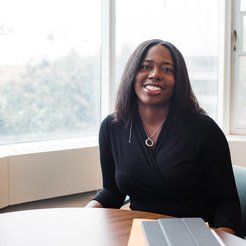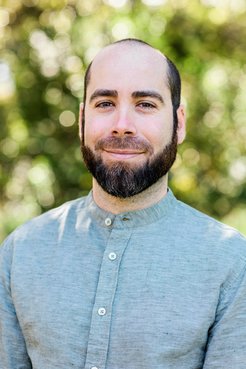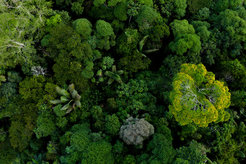“Once the environment is right, excellent science will happen”
Interview with HHMI Freeman Hrabowski Scholars Elizabeth Johnson and Moisés Expósito-Alonso
Moisés Expósito-Alonso and Elizabeth Johnson receive this year’s Freeman Hrabowski Scholarship. The distinction, awarded by the Howard Hughes Medical Institute (HHMI), is endowed with up to $8.6 million of research funding over up to 10 years. The two alumni of the Max Planck Institute for Biology Tübingen were selected both for their scientific excellency and their potential to create diverse and equitable lab environments; HHMI anticipates that its scholars will carve out pathways for the inclusive development of the next generation of scientists. This is why we talked with them not only about their research ideas, but also about their path into science, obstacles and helpful influences, diversity in the lab, and what they hope to contribute to society.
Do you remember when you decided to be a researcher?

Elizabeth Johnson: I remember my path into research as a journey. During my undergrad in biology, I studied from textbooks, but I always wanted to learn about the researchers behind the discoveries outlined in my textbooks. Not knowing where to get started, I literally knocked on the doors of active research labs at a nearby medical college. Luckily, I eventually got into a more formal program that placed me in some great research groups. That is when I really understood that science is not like a textbook – static and only good for a couple of decades. Rather, it is about learning and discovering, and you can be a part of that. The more I understood what research was, the more I wanted to do it.
Moisés Expósito-Alonso: There wasn’t a single decision; it became clear over the years as I was fascinated by nature. When my dad was young, he lived in an orchard in southern Spain, where the family cultivated lemon and orange trees. My dad observed nature in our day-to-day life, and his observations prompted him to think in a scientific manner. He took me and my brother back to the orchard and to the countryside, and so we learned to think in an inquiring way. I think this made us want to be researchers; my brother is a neuroscientist! By the time I was a teenager, I was already pretty sure I wanted to pursue my curiosity for nature and become a biologist.
Tell us about something or someone that shaped your career.

Expósito-Alonso: This may sound a bit cheesy, but joining the MPI for Biology Tübingen and working on my PhD under Detlef Weigel’s supervision was probably the best academic decision I have ever taken. Not just because the Max Planck Institute for Biology Tübingen is an amazing intellectual environment, which gives a lot of headroom to the creativity and imagination of researchers, but also because Detlef is truly a deep thinker and a kind advisor.
Johnson: Ruth Ley, my postdoc advisor at Cornell/Tübingen, was (and still is) a huge influence. As I progress through my career, I appreciate more and more the example she set for me in how I run my research group. Dr Alison Gammie, my mentor in grad school, is also one of the most influential mentors in my career. She always finds time to listen and empowered me to do the research I wanted to do. My mentors helped me see a place for myself in academia. I could not see myself navigating this environment, much less running a research group; but in their minds, this was always a possibility. I am forever grateful for their unwavering belief in me.
As a young researcher with leadership responsibility, what ideas guide how you run your lab?
Johnson: My lab is all about the people in it. I am extremely fortunate that I’ve had postdocs, students, technicians who are eager to learn and tackle the unknown; it is a privilege to be able to do science with them. Part of my job is to make sure that they have the resources that enable them to succeed in what they are good at and what they want to do. This guides my decisions on a large and on a small scale.
Expósito-Alonso: I would like to add something I had to learn in the past few years as an Assistant Professor: A good leader does not simply tell people what to do. Instead, leading is about creating an alignment between yourself and everybody else, so that all group members work towards the lab’s mission. You need to inspire your team, to empower and encourage them to follow their passions and their instincts. This also means bringing humanity and personal relationships to science and taking care of your lab members. Once the environment is right, excellent science will happen.

What are your ideas for fostering equality, diversity, and an inclusive workplace environment?
Johnson: To help someone navigate their journey through science, I try to keep sight of the whole person. This includes understanding what issues my group members are facing, and reflecting on the real, addressable barriers in the system.
Expósito-Alonso: Yes, absolutely. Unfortunately, we are still a long way from having a really equitable environment in academia. I try my best to bring a diverse group of people together and to consider everyone’s different needs. Not just because it is the right thing to do, but also because scientific discoveries come from diverse ways of thinking. Science needs this diversity.
What do you think needs to change in academia?
Johnson (laughs): This is really a good question, I wonder what Moi will have to say! As researchers doing innovative science, we keep an open mind and are used to thinking beyond what’s on the paper. We can also channel these skills when facing issues in academia. We need to understand the goals of the current practices, and sometimes find new ways to achieve them. For example, think about those anxiety-inducing exams in college. They fulfill a purpose, but can we maybe get to the purpose without the barrier-producing side effects? My hope is to remove unnecessary barriers, so that people can have a little bit of fun – actually, a lot of fun – doing what they are passionate about.
Expósito-Alonso: Here in Stanford, we are surrounded by the enormous tech companies of Silicon Valley. One thing we can learn from them is to create new appealing career paths for people with different goals and preferences. Too often, an academic career requires you to sacrifice other aspects of your life, such as a competitive salary, and some people just cannot do that because of their life circumstances. Creating alternative opportunities would hence foster a more diverse and richer academic environment.
Let’s switch gears and talk science! What are you currently working on?

Expósito-Alonso: In the past, we have had a part in uncovering the genomic architecture of the model plant Arabidopsis thaliana. We have been trying to understand how genetic variation controls certain adaptive traits of these plants: How can the plant thrive in different climates? How can it vary its timing of flowering, the growth rates, or the water use efficiency? We are now expanding into new realms, trying to see the bigger picture: How does the genomic architecture in evolutionary processes impact not just one species, but many millions? What are the common evolutionary genetic processes across species which regulate their adaptation to a changing climate? We believe that many plants are trying to adapt rapidly, but anthropogenic interference – think, for example, of deforestation – impacts the number of trees and their genetic variation and thereby hampers their ability to evolve. We want to crack the genetic code of adaptation by studying how evolution happened in the past and see if we can recreate it through gene editing.
Johnson: We are interested in how nutrients in our diets interact with the microbiome, and the consequences these interactions have – especially during infancy. How are nutrients in human milk important to the development of the microbiome during the first few months of life? It’s a fun project because we get to work in the lab as well as with people: First, we study how specific nutrients are consumed by microbiomes. If we give gut microbes certain nutrients, what metabolic products can we observe? Then we go a step further and apply our findings to the infant microbiome, working with babies and their caregivers. Are the metabolites from our models really relevant for infant health? Do healthy versus sick infants have more or less of these diet-dependent microbiome-derived metabolites?
In what way might your work have an impact on society?
Expósito-Alonso: We are in dire need to conserve biodiversity. But often conservation efforts – such as breeding a species in captivity or protecting geographic regions – do not incorporate the evolutionary and genetic aspects. Species are constantly evolving, and we need to take that into account. We now know how relevant genetics is for adaptation. Predictive genomic modeling can help with administering natural resources better and protecting species.

Johnson: My goal is to provide caregivers of infants with accessible knowledge. Baby can’t talk to you, so you’re often left guessing what’s going on with baby’s health. Providing meaningful explanations for caregivers can help enhance care. That being said, my main advice to caregivers is: You’re doing great! Every caregiving team is awesome, because every day presents different challenges and opportunities, and you’ve got to roll with the punches. When we work with caregiving teams, I’m grateful we can be a part of this amazing time in their lives and learn from them.




